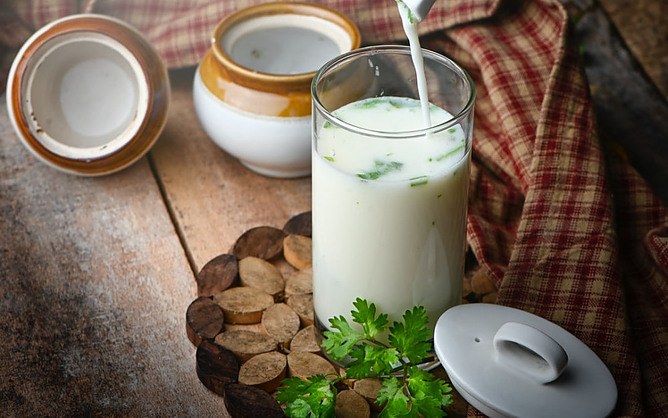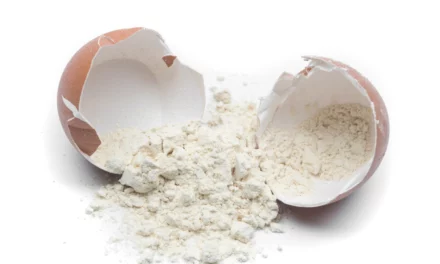Whether it’s the delicious crispy fried chicken or homemade biscuits, Buttermilk is an ingredient used by many to enhance the flavor. But, is Buttermilk good for diabetics? How does Buttermilk affect diabetes? What is the relationship between Buttermilk and diabetes?
We will be addressing all those questions in this article.
In this article, we will also talk about the benefits of Buttermilk, the side effects it might have on people with diabetes if any, and whether it is a suitable substitute for milk or any other ingredients while making a dish.
Let’s start rolling, but first, let’s define Buttermilk.
What is Buttermilk?
So let us start first with what Buttermilk is.
As the word itself suggests, Buttermilk is a fermented beverage leftover after the churning of butter.
However, there is no butter in Buttermilk. Instead, Buttermilk is a healthy liquid that is non-fat and has a rich taste.
Not to be confused with regular milk either, Buttermilk is slightly acidic in comparison to regular milk.
Due to it being so thick, Buttermilk is not regularly consumed on its own, but it can be.
Buttermilk makes a great addition to different baking recipes and fried foods.
How is Buttermilk Made?
Today, most Buttermilk is made from an industrial process that is more like yogurt making than stirring.
Add bacterial culture to pasteurized low-fat or skim milk and ferment at low temperature for 12-14 hours. Salt, stabilizers and sugar are also added. This type of Buttermilk is referred to as cultured Buttermilk.
There is a saying that the Buttermilk available nowadays is not the same Buttermilk your grandmother made. Typically, the old-fashioned Buttermilk was slightly sweeter and made from the remains after churning butter.
Regardless of the process, the fermentation process converts milk sugars into lactic acid that adds that kick of extra flavor to baked items.
What’s in Buttermilk?
For people with diabetes, it is essential to understand the nutritional content of Buttermilk to be able to come to a conclusion about whether it has a positive or negative effect on your blood sugar and health in general.
Below is an extensive table of the nutrients found in Buttermilk that the USDA
has provided.
The nutritional information is per 100 grams serving size.
|
Name |
Amount |
|
Water |
90.1 g |
|
Energy |
40 kcal |
|
Protein |
3.31 g |
|
Total lipid (fat) |
1.07 g |
|
Carbohydrates, by the difference |
4.79 g |
|
Fiber, total dietary |
0 g |
|
Sugars, total including NLEA |
4.79 g |
|
Calcium, Ca |
116 mg |
|
Iron, Fe |
0.05 mg |
|
Magnesium, Mg |
11 mg |
|
Phosphorus, P |
89 mg |
|
Potassium, K |
151 mg |
|
Sodium, Na |
148 mg |
|
Zinc, Zn |
0.42 mg |
|
Copper, Cu |
0.011 mg |
|
Selenium, Se |
2 µg |
|
Vitamin C, total ascorbic acid |
1 mg |
|
Thiamin |
0.034 mg |
|
Riboflavin |
0.154 mg |
|
Niacin |
0.058 mg |
|
Vitamin B-6 |
0.034 mg |
|
Folate, total |
5 µg |
|
Folic acid |
0 µg |
|
Folate, food |
5 µg |
|
Folate, DFE |
5 µg |
|
Choline, total |
17.7 mg |
|
Vitamin B-12 |
0.22 µg |
Health Benefits of Buttermilk
Buttermilk is a powerful source of probiotics and active culture found in plain yogurt, kefir, kombucha, sauerkraut, kimchi and other fermented foods that aid digestion and promote intestinal health.
A glass of Buttermilk before bedtime calmed many’s belly and frayed nerves.
Buttermilk is one of the best sources of calcium. The calcium in Buttermilk helps strengthen and maintain bones.
Furthermore, the use of Buttermilk keeps the gums and teeth healthy.
Buttermilk is a great source of protein that helps build muscles too.
Many people are lactose intolerant and cannot consume milk or other dairy products. But the good news is that even people with lactose-intolerant can consume Buttermilk without any considerable side effects.
Buttermilk can also aid in lowering your cholesterol. The sphingolipid compounds in the dairy product absorb cholesterol in your gut. Some evidence shows that Buttermilk also reduces blood pressure.
Dr. Jennifer Jackson at Ascension Via Christi Health has said that Buttermilk has shown strong signs of preventing colon cancer.
But the best part of Buttermilk has nothing to do with its flavor or nutritional value.
It’s a bit thick, so it’s not just one of those drinks you can swallow and go out. You are forced to drink it slowly and give yourself a moment of rest before starting your day, even if it is only short.
Does Buttermilk Increase Blood Sugar?
Buttermilk contains a generous portion of sugar which is not too high but can be a danger if consumed in a larger quantity, especially with diabetes.
So naturally, the intake of Buttermilk will increase blood sugar. Therefore, people with diabetes should be careful with the amount of consumption of this low-fat milk product to prevent high levels of blood sugar.
Can Diabetics Drink Buttermilk?
People with diabetes are advised to eat little quantity of Buttermilk at a time, and Buttermilk is a good inter-meal snack for them. This is if their dietician or medical professional does not object to eating Buttermilk.
Those with gestational diabetes also benefit from Buttermilk, a product with a low glycemic index. It provides a natural source of glucose and vitamins. It also contains probiotics that aid in the digestive process.
To sum it up, yes, all people with prediabetes and early-stage diabetes can consume Buttermilk before or in between meals. This is a great alternative to many snacks.
Is Buttermilk Good For Diabetics?
Yes, Buttermilk can be a great addition to the dietary habits of people with early-stage diabetes. It has many benefits and can indirectly aid people with type 2 diabetes.
Below are a few benefits that Buttermilk provides.
- No Cholesterol
People with diabetes tend to have high levels of bad cholesterol, which attach to the walls of blood vessels and make them more susceptible to damage.
Buttermilk does not contain cholesterol, so it is a healthier option for diabetics.
In addition, Buttermilk has certain compounds that help reduce the bad types of cholesterol in the body.
- Dehydration
Hydration is very important, especially for people with diabetes. When water is scarce, sugar concentrates in the body and water levels peak. To prevent this, you will need to absolutely avoid dehydration.
Buttermilk is 90% of water. Other nutrients make up the remaining 10%. With plenty of water, Buttermilk is your surefire way to hydrate your body.
- Gut Support
The gut-pleasant microorganism in buttermilk aids digestion. This increases the performance of digestion. Lactic acid additionally promotes better bowel movement.
Buttermilk may be used to cure Irritable Bowel Syndrome (IBS). IBS is a condition wherein someone experiences aches inside the belly, frequently followed by either diarrhea or constipation. It is an end result of intestinal malfunctioning.
Buttermilk drink is beneficial in stopping situations like acidity, belly infections, and colon cancer. People who drink Buttermilk get to avoid digestion-associated diseases and also have a more potent immune system. People with diabetes can use Buttermilk to evade any chances of gut complications.
- Cleansing
Buttermilk cleanses the body naturally.
Instead of having those sugar-loaded smoothies, a glass of Buttermilk can help fight off the summer heat and keep you fresh.
- Improve Recovery
Comprised of zinc and calcium, Buttermilk helps with carbohydrate metabolism. Both these nutrients allow your body to recover from wounds or diseases.
- Vitamins
There are many vitamins in Buttermilk that play a major role.
For example, this healthy dairy product contains vitamin B12 and vitamin D that prevent anemia and help improve your bones and vision.
What Does Research Say About Buttermilk And Diabetes?
Buttermilk and other dairy products are said to reduce the occurrences of type 2 diabetes if you no the limits.
Research carried out by some scientists in Canada concluded that dairy products, including Buttermilk, have shown signs of preventing type 2 diabetes.
The study suggests that dairy intake is significantly associated with a reduced type 2 diabetes risk and likely in a dose-response manner. However, it is eminent that more research is needed better to understand the role of regular-fat and specific dairy products.
When Can Buttermilk Be Harmful?
When consumed on a daily basis, small portions are the way to go.
Buttermilk is not recommended in large quantities for people with diabetes. Larger amounts of Buttermilk can result in diabetics forming an allergic reaction to dairy products with the potential for high blood sugar episodes.
Secondly, if you have a history of high blood sugar levels, it is advised not to consume Buttermilk in bigger portions. This may have an adverse effect on your health and raise your blood sugar level beyond reach.
Furthermore, people with diabetes should treat Buttermilk like any other food they have. Fruits, for example, have natural sugars, but even those in a larger quantity can be bad for people with diabetes.
Buttermilk is a strong probiotic; if taken in larger quantities, it can affect your stomach and lead to nausea and diarrhea.
So, in conclusion, Buttermilk is harmful when consumed in insane amounts.
Tips On Consuming Buttermilk For Diabetics
Buttermilk itself is a healthy substitute for regular milk for people with diabetes.
A glass of Buttermilk can be taken on a regular basis, but because it is so thick, not many diabetics would prefer it to have it that way.
If you do not like to have Buttermilk on its own, there are many recipes where this healthy dairy product can be used.
Buttermilk can be used in waffles, a delicacy best enjoyed during breakfast. It can also be used in the baking of cakes, biscuits, muffins etc.
Buttermilk adds a great texture and flavor to your dishes, and diabetics can combine it with any foods they enjoy eating the most.
For type 2 diabetics especially, Buttermilk can be a great substitute for sugar since it has natural sugars in it. But, again, you should take advice from your healthcare professional.
Type 2 diabetics can also make their own Buttermilk at home if they do not enjoy the processed one. Making Buttermilk is pretty simple, and tons of recipes for this dairy product can be found online.
Alternative Healthier Options For Buttermilk
While Buttermilk is itself a healthier alternative for diabetics, it can be still replaced with many other options.
Regular milk and vinegar can be used to make Buttermilk, or instead of vinegar, lemons can also be used. Both these ingredients add to the acidity of the Buttermilk.
Plain kefir is also quite similar to Buttermilk and can be a great substitute for it. The unflavored kefir is also said to contain for beneficial bacteria and microbes than Buttermilk.
That being said, these substitutes can either prove to be a healthier or less healthy option. That heavily depends on the nutritional facts of the alternatives and their effect on diabetes.
Conclusion
Buttermilk doesn’t need to be a regular part of your diet, especially if you have type 2 diabetes. However, Buttermilk acts as a great substitute for regular milk and many other beverages.
With a long list of benefits and very few cons, Buttermilk can prove to be one of the healthier choices people with early-stage diabetes can make when adding it to their diet.
But, it definitely goes without saying that the consumption of Buttermilk should be monitored daily, and larger amounts in a short period of time should be avoided to prevent the risks of certain illnesses.
From its capability to help improve digestion to the fact that Buttermilk provides a large list of nutrients to satisfy the needs of the body, it is safe to say that this is a great part of the diet plan for people with diabetes if professional advice does not object.











